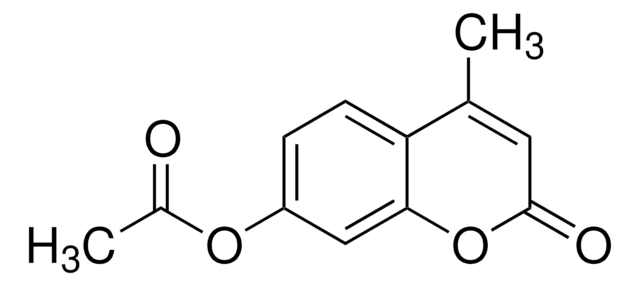M1381
4-Methylumbelliferone
≥98%
Synonym(s):
β-Methylumbelliferone, 4-MU, 7-Hydroxy-4-methylcoumarin
Sign Into View Organizational & Contract Pricing
All Photos(3)
About This Item
Empirical Formula (Hill Notation):
C10H8O3
CAS Number:
Molecular Weight:
176.17
Beilstein:
142217
EC Number:
MDL number:
UNSPSC Code:
12352100
PubChem Substance ID:
NACRES:
NA.22
Recommended Products
Quality Level
Assay
≥98%
color
off-white to yellow
fluorescence
λex 372 nm; λem 445 nm in ethanol
SMILES string
CC1=CC(=O)Oc2cc(O)ccc12
InChI
1S/C10H8O3/c1-6-4-10(12)13-9-5-7(11)2-3-8(6)9/h2-5,11H,1H3
InChI key
HSHNITRMYYLLCV-UHFFFAOYSA-N
Looking for similar products? Visit Product Comparison Guide
Related Categories
Application
4-Methylumbelliferone is primarily used in synthesizing medicinal compounds and as a building block for fluorescent probes. Applications include synthesis of:
- coumarin triazole derivatives as potential antimicrobial agents.
- coumarin salen-based fluorescence sensors for Mg2+ detection.
- pyranocoumarin derivatives as anti-hyperglycemic and anti-dyslipidemic agents.
- coumarin piperazine derivatives as potential multireceptor atypical antipsychotics.
- 4-methylumbelliferyl T-antigen as a substrate for endo-α-N-acetylgalactosaminidase.
Storage Class Code
11 - Combustible Solids
WGK
WGK 2
Personal Protective Equipment
dust mask type N95 (US), Eyeshields, Gloves
Choose from one of the most recent versions:
Already Own This Product?
Find documentation for the products that you have recently purchased in the Document Library.
Customers Also Viewed
Pyranocoumarins: A new class of anti-hyperglycemic and anti-dyslipidemic agents.
Kumar A, et al.
Bioorganic & Medicinal Chemistry Letters, 19(22), 6447-6451 (2009)
Synthesis and evaluation of a class of new coumarin triazole derivatives as potential antimicrobial agents.
Shi Y and Zhou C-H
Bioorganic & Medicinal Chemistry Letters, 21(3), 956-960 (2011)
Yiyi Liu et al.
ACS nano, 13(6), 6760-6769 (2019-05-31)
Thiol-polystyrene (SH-PS)-capped plasmonic nanoparticles can be fabricated into free-standing, one-nanoparticle-thick superlattice sheets (termed plasmene) based on physical entanglement between ligands, which, however, suffer from irreversible dissociation in organic solvents. To address this issue, we introduce coumarin-based photo-cross-linkable moieties to the
Na+ triggered fluorescence sensors for Mg2+ detection based on a coumarin salen moiety.
Dong Y, et al.
Organic Letters, 13(9), 2252-2255 (2011)
Tz-Ching Yeh et al.
Freshwater biology, 65(11), 1973-1988 (2020-12-09)
Bamboo, as a pioneer vegetation, often forms forests on bare lands after catastrophic landslides. Compared to evergreen forest soil, bamboo forest soil is much more labile, with a higher percentage of microbially derived organic carbon (OC), lower molecular weight, and
Our team of scientists has experience in all areas of research including Life Science, Material Science, Chemical Synthesis, Chromatography, Analytical and many others.
Contact Technical Service










